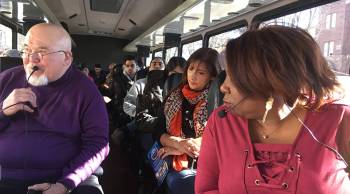
The life and legacy of A.G. Gaston: a man who quietly helped fund the Civil Rights Movement
The life and legacy of A.G. Gaston: a man who quietly helped fund the Civil Rights Movement


Today is the first day of February and the first day of Black History Month, so we’re taking a look back at a powerful but not widely known figure in the Civil Rights Movement who worked behind the scenes with Martin Luther King Jr. and so many others on the economic side of the movement.
He was a Black American entrepreneur named Arthur George Gaston, also known as A.G. Gaston. He mostly shunned the spotlight and wasn’t one to march or deliver speeches at rallies. But the Alabama native and grandson of slaves wrote plenty of checks.
While King was a social activist, A.G. Gaston was an economic activist. He spent more than 70 years investing millions of dollars into the Civil Rights Movement and Black America.
“Find a need and fill it,” said Rochelle Gaston Malone, A.G. Gaston’s granddaughter.
His business strategy, she said, was rooted in the fact that Jim Crow-era businesses — just about every sector — used segregationist practices and policies that didn’t accommodate Black people or weren’t fair or equitable. A.G. Gaston capitalized on the opportunity to form businesses that treated Black consumers with the dignity they deserved, combining altruism with capitalism.
He was also guided by another simple mantra: “A part of all you earn is yours to keep. My grandfather truly understood that it was important for us as African Americans to earn a living for our families,” said Gaston Malone.
He built a diversified company in Birmingham that included insurance, real estate, construction, and a motel, among other divisions. In 1957, he founded the Citizens Federal Savings and Loan Association, the first Black-owned bank in Birmingham. He used his profits and his business acumen to quietly promote social justice. (The motel Gaston owned, the A.G. Gaston Motel, a location central to the Civil Rights Movement, was named a National Treasure in 2016 and reopened following renovations last summer.)
“He wasn’t in on the forefront, you know, marching or on the front lines in that capacity,” Gaston Malone said. “But he understood that there needed to be someone who could serve as a liaison between those powers that be who made the decisions as to help provide the outcomes that we, as African American people, were searching to receive through the marches and through all of the demonstrations.”
But even as he created jobs, provided accommodations and made insurance-generated wealth within reach for generations of Black American families, he was criticized by some in the Black community. Critics believed he was too close to people in the white power structure and took the fact that he was never at marches preaching through a bullhorn to mean he wasn’t committed to the movement.
Some also criticized him for bailing protesters out of jail, thinking it undermined their efforts. Reverend Joseph Lowery, a longtime civil rights activist with King and president of the Southern Christian Leadership Conference, defended Gaston saying, “Everyone has a role to play. His role was a supportive role. Some people have to beat the drum while others marched.”
A.G. Gaston died in 1996 at 103 years old.
For Rochelle Gaston Malone, the ultimate way to honor her grandfather would be to immortalize his name in the district that housed some of the businesses, churches and community buildings that relied on Gaston for early funding. His family has been working to get a street named after him, as well as a park that sits amongst the financial hub Gaston created — a legacy for the man who planted the trees of Black economic success in Birmingham.
There’s a lot happening in the world. Through it all, Marketplace is here for you.
You rely on Marketplace to break down the world’s events and tell you how it affects you in a fact-based, approachable way. We rely on your financial support to keep making that possible.
Your donation today powers the independent journalism that you rely on. For just $5/month, you can help sustain Marketplace so we can keep reporting on the things that matter to you.




















